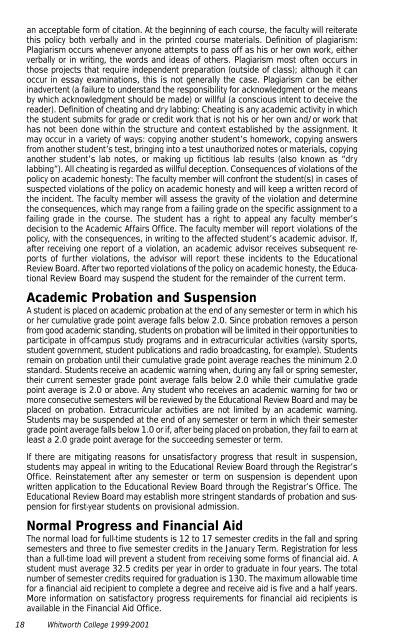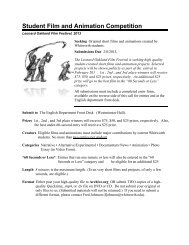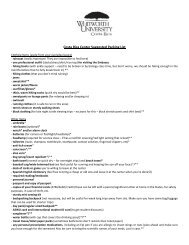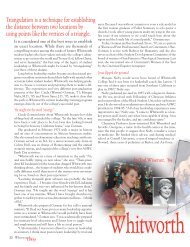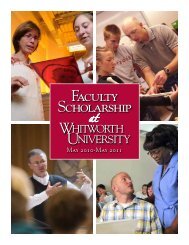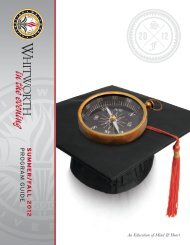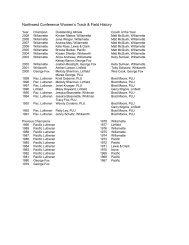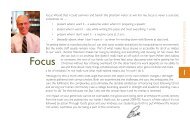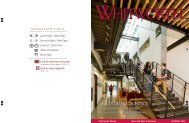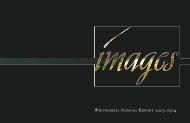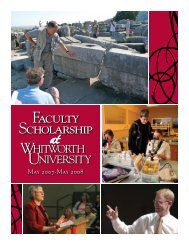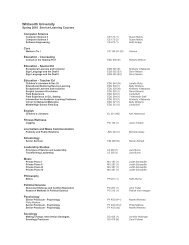Whitworth Catalog 1999-2001 - Whitworth University
Whitworth Catalog 1999-2001 - Whitworth University
Whitworth Catalog 1999-2001 - Whitworth University
You also want an ePaper? Increase the reach of your titles
YUMPU automatically turns print PDFs into web optimized ePapers that Google loves.
an acceptable form of citation. At the beginning of each course, the faculty will reiterate<br />
this policy both verbally and in the printed course materials. Definition of plagiarism:<br />
Plagiarism occurs whenever anyone attempts to pass off as his or her own work, either<br />
verbally or in writing, the words and ideas of others. Plagiarism most often occurs in<br />
those projects that require independent preparation (outside of class); although it can<br />
occur in essay examinations, this is not generally the case. Plagiarism can be either<br />
inadvertent (a failure to understand the responsibility for acknowledgment or the means<br />
by which acknowledgment should be made) or willful (a conscious intent to deceive the<br />
reader). Definition of cheating and dry labbing: Cheating is any academic activity in which<br />
the student submits for grade or credit work that is not his or her own and/or work that<br />
has not been done within the structure and context established by the assignment. It<br />
may occur in a variety of ways: copying another student’s homework, copying answers<br />
from another student’s test, bringing into a test unauthorized notes or materials, copying<br />
another student’s lab notes, or making up fictitious lab results (also known as “dry<br />
labbing”). All cheating is regarded as willful deception. Consequences of violations of the<br />
policy on academic honesty: The faculty member will confront the student(s) in cases of<br />
suspected violations of the policy on academic honesty and will keep a written record of<br />
the incident. The faculty member will assess the gravity of the violation and determine<br />
the consequences, which may range from a failing grade on the specific assignment to a<br />
failing grade in the course. The student has a right to appeal any faculty member’s<br />
decision to the Academic Affairs Office. The faculty member will report violations of the<br />
policy, with the consequences, in writing to the affected student’s academic advisor. If,<br />
after receiving one report of a violation, an academic advisor receives subsequent reports<br />
of further violations, the advisor will report these incidents to the Educational<br />
Review Board. After two reported violations of the policy on academic honesty, the Educational<br />
Review Board may suspend the student for the remainder of the current term.<br />
Academic Probation and Suspension<br />
A student is placed on academic probation at the end of any semester or term in which his<br />
or her cumulative grade point average falls below 2.0. Since probation removes a person<br />
from good academic standing, students on probation will be limited in their opportunities to<br />
participate in off-campus study programs and in extracurricular activities (varsity sports,<br />
student government, student publications and radio broadcasting, for example). Students<br />
remain on probation until their cumulative grade point average reaches the minimum 2.0<br />
standard. Students receive an academic warning when, during any fall or spring semester,<br />
their current semester grade point average falls below 2.0 while their cumulative grade<br />
point average is 2.0 or above. Any student who receives an academic warning for two or<br />
more consecutive semesters will be reviewed by the Educational Review Board and may be<br />
placed on probation. Extracurricular activities are not limited by an academic warning.<br />
Students may be suspended at the end of any semester or term in which their semester<br />
grade point average falls below 1.0 or if, after being placed on probation, they fail to earn at<br />
least a 2.0 grade point average for the succeeding semester or term.<br />
If there are mitigating reasons for unsatisfactory progress that result in suspension,<br />
students may appeal in writing to the Educational Review Board through the Registrar’s<br />
Office. Reinstatement after any semester or term on suspension is dependent upon<br />
written application to the Educational Review Board through the Registrar’s Office. The<br />
Educational Review Board may establish more stringent standards of probation and suspension<br />
for first-year students on provisional admission.<br />
Normal Progress and Financial Aid<br />
The normal load for full-time students is 12 to 17 semester credits in the fall and spring<br />
semesters and three to five semester credits in the January Term. Registration for less<br />
than a full-time load will prevent a student from receiving some forms of financial aid. A<br />
student must average 32.5 credits per year in order to graduate in four years. The total<br />
number of semester credits required for graduation is 130. The maximum allowable time<br />
for a financial aid recipient to complete a degree and receive aid is five and a half years.<br />
More information on satisfactory progress requirements for financial aid recipients is<br />
available in the Financial Aid Office.<br />
18 <strong>Whitworth</strong> College <strong>1999</strong>-<strong>2001</strong>


